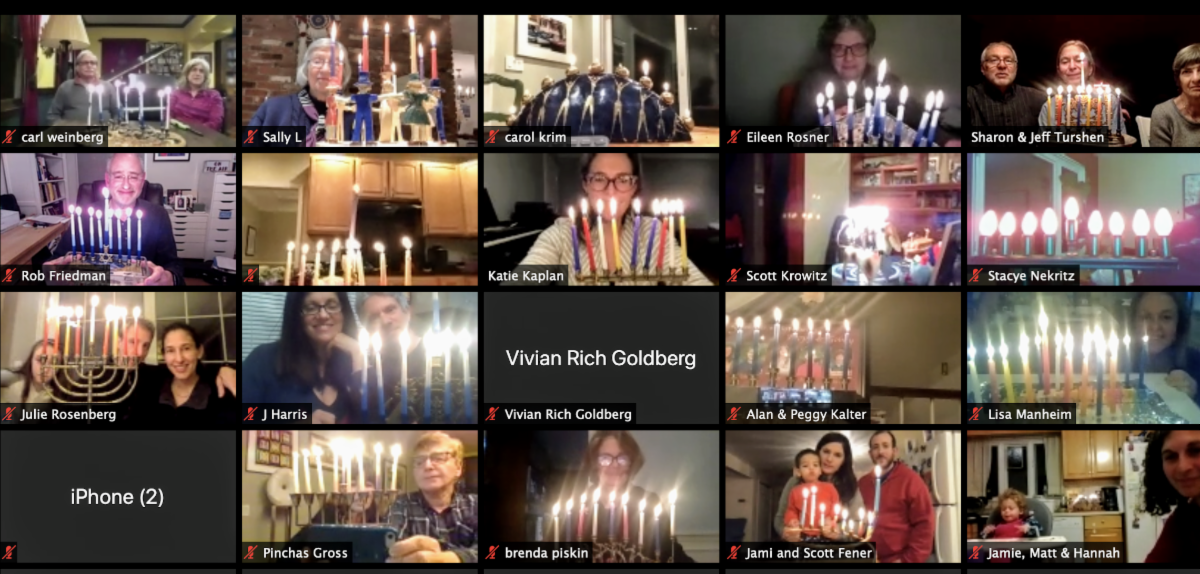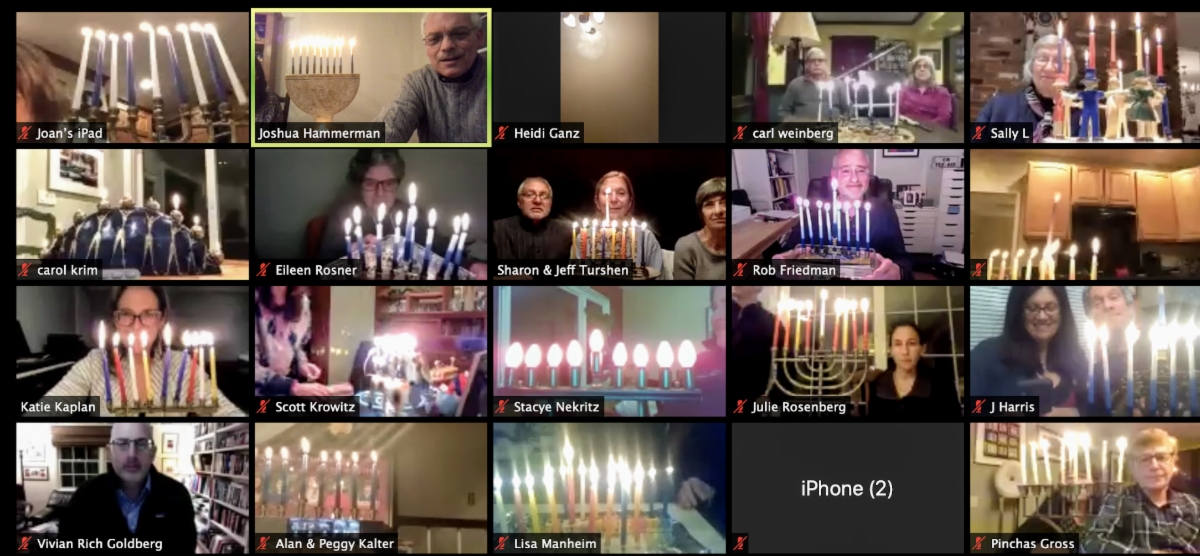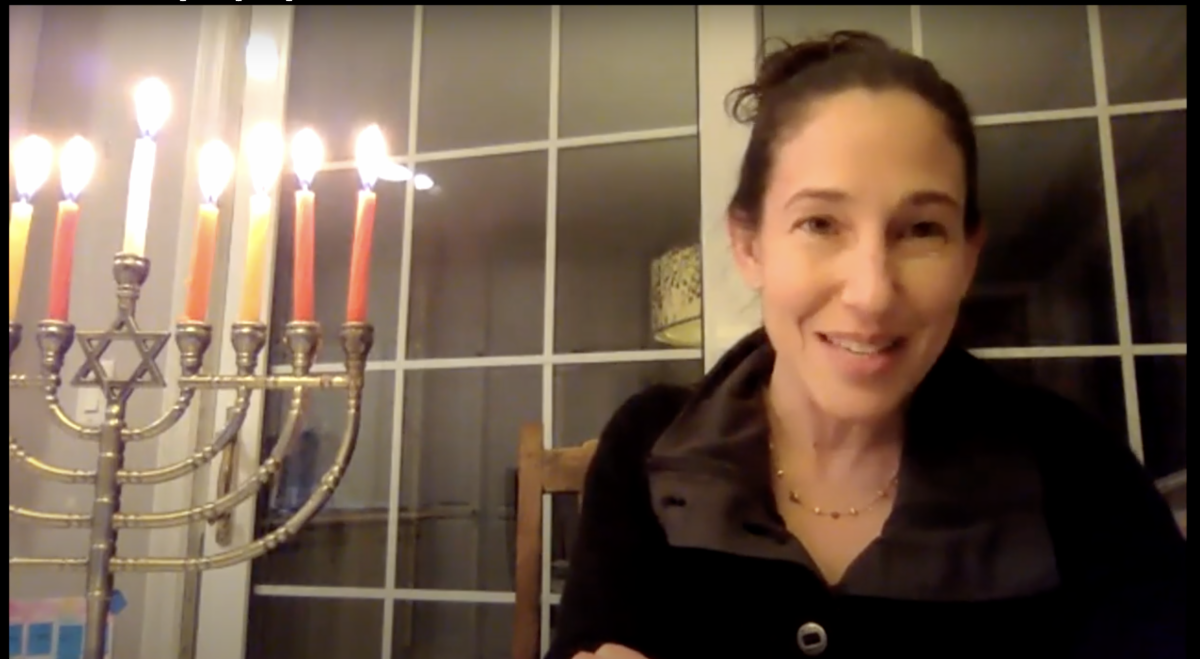Screen grab from last week's Bar Mitzvah of Aaron Friedman
--------------
With the holiday concluding, as we clear away the snow and hunker down in our bunkers, here's some good stuff worth hearing, watching and reading:
Here are some more suggestion for our time spent cocoon-side:
|
| Racism, Inclusivity and Religion, Part 2 |
Pay special attention to a segment in part two where we learned about how enslaved African were given abridged Bibles so that their religious education would pacify them to obey commands (rather than inspiring them to rise up for freedom). See below how the text of this "Slave's Bible" goes right from the Joseph story to the Ten Commandments narrative, completely "passing over" the first 18 chapters of Exodus and the escape from slavery in Egypt.
Where would Judaism be without the Exodus narrative? We'd be down about a half dozen holidays, for one thing. The purveyors of racist supremacy ripped the heart and soul out of the sacred writ in order to keep them quiet down on the farm. So much for "religious freedom."
But somehow the message still got through, that cry to "Go down, Moses!" was still heard by the enslaved people.
Watch: This Zoom recording of last Sunday's virtual tour of Herodian and other sites built by Herod the Great (and Terrible). And while you are at it, tour the land of Israel far and wide at the
"Israel is Beautiful" site.
Watch: "Valley of Tears" on HBO Plus. Although it didn't quite measure up to other excellent Israeli productions that have streamed recently, like "Our Boys" and "Fauda," this series brought home as never before just how close Israel came to losing everything in the opening days of the Yom Kippur War in 1973. This is a period that fascinates me, since my first trip to Israel occurred just a couple of months before that fateful Day of Atonement, at a time when the country was still basking in the glory of 1967, having no idea what awaited them around the bend. Sort of like us a year ago.
|
| Class Brit Milah, TBE 7th Grade |
Read: If you are a glutton for nostalgia - and punishment - you can read all my coronavirus-related dispatches from the Rabbi's Bunker and elsewhere, here. And you can look back at our High Holiday services here. Read: This excerpt from Natan Sharansky's memoir, "Fear No Evil," which I referenced at lat night's candle lighting, describing Hanukkah in the Soviet Gulag, 1980s
Natan (Anatoly) Sharansky was arrested in 1977 for his Zionist activism, his insistence on the right of Russian Jews to make aliyah to Israel. He sat in prison from 1977 to 1986 including eight years in a Soviet prison camp in Siberia. After continuous public protest in the West, Sharansky was released in a spy exchange between the US and the USSR in 1986. His memoirs of the Soviet period are filled with anecdotes about the power of the few against the many - the power that derives from "fearing no evil" and laughing in the face of oppression. The phrase, "fear no evil," is taken from the little book of Psalms, which he carried with him through his long imprisonment.
The holiday of Hanukkah was approaching. At the time, I was the only Jew in the prison zone, but when I explained that Hanukkah was a holiday of national freedom, of returning to one's own culture in the face of forced assimilation, my friends in our "kibbutz" decided to celebrate it with me. They even made me a wooden menorah, decorated it, and found some candles.
In the evening I lit the first candle and recited a prayer that I had composed for this occasion. Tea was poured, and I began to describe the heroic struggle of the Maccabees to save their people from slavery. For each zek [a prisoner in the Soviet Gulag] who was listening, this story had its own personal meaning. At one point the duty officer appeared in the barracks. He made a list of all those present, but did not interfere.
On each of the subsequent evenings of Hanukkah I took out my menorah, lit the candles, and recited the appropriate blessing. Then I blew out the candles, as I didn't have any extras. Gavriliuk, the collaborator whose bunk was across from mine, watched and occasionally grumbled, "Look at him, he made himself a synagogue. And what if there's a fire?"
On the sixth night of Hanukkah the authorities confiscated my menorah with all my candles. I ran to the duty officer to find out what had happened.
"The candlesticks were made from state materials; this is illegal. You could be punished for this alone and the other prisoners are complaining. They¹re afraid you'll start a fire."
I began to insist. "In two days Hanukkah will be over and then I'll return this 'state property' to you. Now, however, this looks like an attempt to deny me the opportunity of celebrating Jewish holidays."
The duty officer began hesitating. Then he phoned his superior and got his answer: "A camp is not a synagogue. We won't permit Sharansky to pray here."
I was surprised by the bluntness of that remark, and immediately declared a hunger strike. In a statement to the procurator general I protested against the violation of my national and religious rights, and against KGB [Russian secret police] interference in my personal life.
When you begin an unlimited hunger strike, you never know when or how it will end. Are the authorities interested at that moment in putting a swift end to it, or don't they give a damn? In a few weeks a commission from Moscow was due to arrive in the camp. I didn't know this at the time, but the authorities, presumably, were very aware of it, which probably explains why I was summoned to Major Osin's office two days later, in the evening.
Osin was an enormous, flabby man of around fifty, with small eyes and puffy eyelids, who seemed to have long ago lost interest in everything but food. But he was a master of intrigue who had successfully overtaken many of his colleagues on the road to advancement. During my brief time in the camp he had weathered several scandals and had always managed to pass the buck to his subordinates. I could see that he had enjoyed his power over the zeks and liked to see them suffer. But he never forgot that the zeks were, above all, a means for advancing his career, and he knew how to back off in a crisis.
Osin pulled a benevolent smile over his face as he tried to talk me out of my hunger strike. Osin promised to see to it personally that in the future nobody would hinder me from praying, and that this should not be a concern of the KGB.
"Then what's the problem?" I said. "Give me back the menorah, as tonight is the last evening of Hanukkah. Let me celebrate it now, and taking into account your assurances for the future, I shall end the hunger strike."
"What's a menorah?"
"Candlesticks."
But a protocol for its confiscation had already been drawn up, and Osin couldn't back down in front of the entire camp. As I looked at this predator, sitting at an elegant polished table and wearing a benevolent smile, I was seized by an amusing idea.
"Listen," I said, "I'm sure you have the menorah somewhere. It's very important to me to celebrate the last night of Hanukkah. Why not let me do it here and now, together with you? You'll give me the menorah, I'll light the candles and say the prayer, and if all goes well I'll end the hunger strike."
Osin thought it over and promptly the confiscated menorah appeared from his desk. He summoned Gavriliuk, who was on duty in the office, to bring in a large candle.
"I need eight candles," I said. (In fact I needed nine, but when it came to Jewish rituals I was still a novice.) Gavriliuk took out a knife and began to cut the candle into several smaller ones. But it didn't come out right; apparently the knife was too dull. Then Osin took out a handsome inlaid pocketknife and deftly cut me eight candles.
"Go, I'll call you later," he said to Gavriliuk. Gavriliuk simply obeyed orders. He was a fierce, gloomy man, and this sight must have infuriated him.
I arranged the candles and went to the coatrack for my hat, explaining to Osin that "during the prayer you must stand with your head covered and at the end say 'Amen.'" He put on his major's hat and stood. I lit the candles and recited my own prayer in Hebrew, which went something like this: "Blessed are You, Adonai, for allowing me to rejoice on this day of Hanukkah, the holiday of our liberation, the holiday of our return to the way of our fathers. Blessed are You, Adonai, for allowing me to light these candles. May you allow me to light the Hanukkah candles many times in your city, Jerusalem, with my wife, Avital, and my family and friends."
This time, however, inspired by the sight of Osin standing meekly at attention, I added in Hebrew: "And may the day come when all our enemies, who today are planning our destruction, will stand before us and hear our prayers and say 'Amen.'"
"Amen," Osin echoed back. He sighed with relief, sat down and removed his hat. For some time we looked silently at the burning candles. They quickly melted, and the hot wax was spread pleasantly over the glass surface of the table. Then Osin caught himself, summoned Gavriliuk, and brusquely ordered him to clean it up.
I returned to the barracks in a state of elation, and our kibbutz made tea and merrily celebrated the end of Hanukkah. Naturally, I told them about Osin's "conversion," and it soon became the talk of the camp. I realized that revenge was inevitable, but I also knew they had plenty of other reasons to punish me.
--------
The Roaring Twenties
What will follow this horrific year? Some hints from Isaiah.
This will be the last official Shabbat-O-Gram for 2020, though you will undoubtedly be hearing from me over the next couple of weeks. So here are some
Like many of you, I'm chomping at the bit to say sayonara to 2020. And on January 1 2021, the new decade officially commences - yes, as 2020 ends, the Roaring '20s begin. Chapter 61 of Isaiah puts our aspirations for a fresh start into poetry:
א רוּחַ אֲדֹנָי יְהוִה, עָלָי--יַעַן מָשַׁח יְהוָה אֹתִי לְבַשֵּׂר עֲנָוִים, שְׁלָחַנִי לַחֲבֹשׁ לְנִשְׁבְּרֵי-לֵב, לִקְרֹא לִשְׁבוּיִם דְּרוֹר, וְלַאֲסוּרִים פְּקַח-קוֹחַ. | 1 The spirit of the Lord GOD is upon me; because the LORD hath anointed me to bring good tidings unto the humble; He hath sent me to bind up the broken-hearted, to proclaim liberty to the captives, and the opening of the eyes to them that are bound; |
ב לִקְרֹא שְׁנַת-רָצוֹן לַיהוָה, וְיוֹם נָקָם לֵאלֹהֵינוּ, לְנַחֵם, כָּל-אֲבֵלִים. | 2 To proclaim the year of the LORD'S good pleasure, and the day of vengeance of our God; to comfort all that mourn; |
ג לָשׂוּם לַאֲבֵלֵי צִיּוֹן, לָתֵת לָהֶם פְּאֵר תַּחַת אֵפֶר שֶׁמֶן שָׂשׂוֹן תַּחַת אֵבֶל--מַעֲטֵה תְהִלָּה, תַּחַת רוּחַ כֵּהָה; וְקֹרָא לָהֶם אֵילֵי הַצֶּדֶק, מַטַּע יְהוָה לְהִתְפָּאֵר. | 3 To appoint unto them that mourn in Zion, to give unto them a garland for ashes, the oil of joy for mourning, the mantle of praise for the spirit of heaviness; that they might be called terebinths of righteousness, the planting of the LORD, wherein He might glory. |
ד וּבָנוּ חָרְבוֹת עוֹלָם, שֹׁמְמוֹת רִאשֹׁנִים יְקוֹמֵמוּ; וְחִדְּשׁוּ עָרֵי חֹרֶב, שֹׁמְמוֹת דּוֹר וָדוֹר. | 4 And they shall build the old wastes, they shall raise up the former desolations, and they shall renew the waste cities, the desolations of many generations. |
The first verse speaks specifically to the
rewards of humility alongside a comeuppance for the arrogant; and it envisions a liberation for those imprisoned by systemic injustice and moral blindness. Verses two and three speak directly to those grieving for the unbearable losses of the past year, in particular, the Covid catastrophe. Life-saving masks became our garland - the Hebrew word pe'er translates to "fancy headdress," and in 2020 the masks kept getting fancier all the time.
The oil of joy (shemen sasson) in verse three? That's nothing less than the life-saving elixir, the vaccine, which brought tears of joy to the faces of those first responders who first received it, and like the Hanukkah oil, miraculously, an extra dose could be found in each vial. And now, as verse four proclaims, NOW the rebuilding can at last begin. Infrastructure week at last!
It's no coincidence that the Roaring 1920s followed the dismal, plague-infested end of the prior decade. There was so much pent up need for people to rip off the masks and come together, to celebrate and let loose.
But back in the 20th century's '20s, with that unleashing also came corruption, intolerance and the closing of America's gates to immigrants fleeing the instability of postwar Europe. The excesses of the '20s led to the crash of Wall Street and rise of fascism. Sadly, after the hopeful vision of Isaiah concludes, the next book in the Jewish biblical canon is Jeremiah, who brings us back to square one. It's like following "It's a Wonderful Life" with a screening of "Schindler's List."
Yes, the Bible tells us, it gets better. But then it gets much worse.
I truly hope 2021 will be a great, great year. I expect it to be just that. But the wild ride we've been on will not end.
For that reason, we need community more than ever. We need to continue to gain strength from one another, online and eventually back in our renewed temple, with our new elevator, doors and restrooms - Isaiah doesn't mention rest rooms and elevator, but in verse four he does speak of the "desolations of many generations"
(shomemot dor - door"). OK, one bad pun is allowed.
And through it all, we will build from the many growth experiences of the past year, in particular the new partnerships forged with the Black and immigrant communities.
As we join together to welcome in the new year, let's make one resolution above all - to bring to fulfillment the vision of Isaiah 61, to make this a year of divine pleasure, where sanctity governs all our actions - led by our new President-Mensch. And let 2021 be a year that will, as Isaiah promises, bring comfort all who mourn.
Rabbi Joshua Hammerman



































































